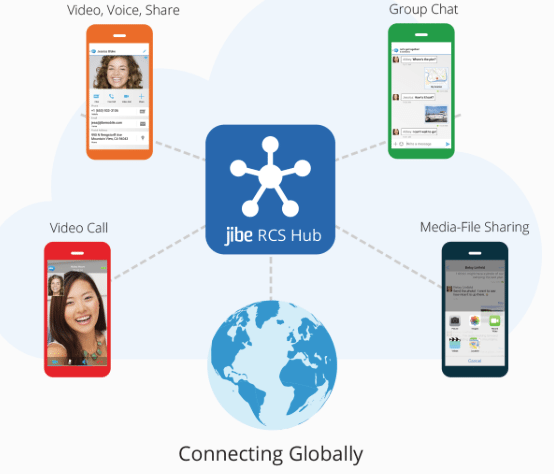Google’s recent acquisition of Jibe Mobile is an exciting move in the evolution of rich communications services and promises to be a real step forward in the battle for mobile network providers to wrestle control of instant messaging from Apple and popular over-the-top players that rely on closed groups for their services.
Apple’s iMessenger is one of the core services offered by Apple and takes on the mobile operators directly with a core communications service. However, the facility itself is limited by the inability to send messages outside of the Apple user community – a disadvantage shared by OTTs such as WhatsApp and Viber. Google moving into the RCS space is a significant development as the open standards offered by RCS promises to provide services as ubiquitous as text messaging and ensures its launch will be fully interoperable with operator services being launched all over the world. This acquisition is consistent with Google’s usual strategy of launching open technologies and solutions and will be expected to reap further rewards from this acquisition.
The GSMA-led RCS initiative aims to provide next-generation all-IP communications services, which take all of the most popular elements of OTT communications and combine them with the ubiquity and full interoperability of an operator-led service such as traditional voice or text messaging.
RCS comprises next-generation voice and support for voice-over-LTE, instant messaging, group chat, voice conferencing services and video calling. The benefits for end users are wide-ranging; VoLTE offers much higher quality calls for those using app-based VoIP services, and for users of other services already available through over-the-top applications, RCS enables services to be used cross-handset.
RCS can make all electronic personal devices (tablets, laptops, etc.) into cellular devices, even if they don’t carry a SIM. Subscribers can send and receive instant messages, text messages, group chats, pictures, videos and have voice calls with anyone, using whichever device is most convenient for them. This is key for a player like Google, which wants involvement with every personal device.
For mobile operators, these enhanced services are built on the same IP multimedia subsystem core backbone that allows advanced LTE services. This is the latest iteration of the mobile technologies, which is already being rolled-out by carriers across the world to future-proof their network infrastructure.
The GSMA first started setting the protocols for RCS back in 2007, and since then uptake has been relatively slow until the advent of LTE and associated IMS backbone technology gave service providers the ability to enable these services to run to their maximum ability. Since the protocols were first defined, OTTs have taken the initiative and created demand for services such as instant messaging. However, operators still hold some keys to enabling these apps to run effectively and there are still significant barriers to the further growth of many current OTT applications.
One of the most pertinent challenges is solving the ubiquity issue. For example, voice and video OTT applications lack the ability to fall back on traditional ubiquitous circuit-switched 2G/3G network should the Wi-Fi or LTE they are reliant on become unavailable or fail to provide the right quality. With RCS, this fall-back is enabled and works wherever the customer is in the world. To avoid high data roaming costs while abroad, they can use the same RCS app, but circuit-switched rather than through the LTE network. A further challenge is to achieve universal interoperability: End-users don’t like to manage several apps to communicate with all of their contacts. RCS is the one and only option that can provide a universal experience, whether communicating with someone domestically or abroad.
From this perspective, it is clear that RCS offers the right features for mobile operators to gain a competitive advantage over OTT providers and supply services, which ensure customer loyalty through improved quality of experience.
From the mobile operators’ point of view, there is a clear appetite for next-generation services built using IMS infrastructure, with the North American market especially advanced. AT&T Mobiity, Verizon Wireless, T-Mobile US, Telus, Sprint, Rogers, etc., have all started building-out their IMS services, with RCS already launched by T-Mobile US.
While larger operators are already investing in this infrastructure and marketing these services, smaller operators, mobile virtual network operators and those without the immediate facilities to launch IMS infrastructure can instead use a hosted model. Using these models, operators can decrease time to market and ensure they don’t fall behind competitors and OTT players already providing these services.
RCS has the potential to completely change the dynamic of communication services with improved quality and ubiquity, and the entry of Google into this market provides the fresh impetus, which can drive the technology to achieve further success.
Luc Vidal-Madjar is strategy and business development manager at international wholesale carrier BICS. Vidal-Madjar has more than 15 years of experience in carrier services within the telecom industry and is now responsible for the development of new innovations within the data sector including LTE roaming and next-generation messaging.
Editor’s Note: In an attempt to broaden our interaction with our readers we have created this Reader Forum for those with something meaningful to say to the wireless industry. We want to keep this as open as possible, but we maintain some editorial control to keep it free of commercials or attacks. Please send along submissions for this section to our editors at: dmeyer@rcrwireless.com.

